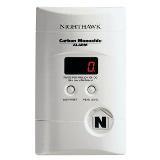 In two of our most recent articles, we stated, “Each year all gas-fired appliances and the venting associated with it, should undergo a yearly inspection and be tuned up by a licensed and knowledgeable HVAC contractor certified by NCI or a similar organization. While we feel that all houses should have a carbon monoxide detector in them, it is important that any house with a gas-fired appliance have at least one operable one in them.”
In two of our most recent articles, we stated, “Each year all gas-fired appliances and the venting associated with it, should undergo a yearly inspection and be tuned up by a licensed and knowledgeable HVAC contractor certified by NCI or a similar organization. While we feel that all houses should have a carbon monoxide detector in them, it is important that any house with a gas-fired appliance have at least one operable one in them.”
While we did use the term gas-fired above, it also applies to the use of other materials like propane, oil, & even charcoal (but no one is stupid enough to use a charcoal grill inside, right?). In this article, we are going to focus on combustion appliances located in many homes like the Hot Water Heater, Furnace, and Oven.
The Inspection & Tune Up:
While it would be so easy to pick on the fliers distributed, promising you the world for $59 or $69, I rather focus on what should be included in a visit. The following list shows the minimum items that should be tested on the furnace courtesy of Southern Company:
- Clean burners, combustion chamber, and heat exchange surfaces
- Check color of flame: the proper color is blue; a yellow indicates that the gas is not burning properly and the equipment should be adjusted by a professional
- Check fan belts and blowers
- Check safety controls
- Check thermostat operation
- Check thermocouple and pilot light assembly (if applicable)
- Check for proper venting
- Inspect and replace filters
- Lubricate all motors
- Perform a combustion efficiency test
While that is a nice list & a company might say they do all that, you should confirm that when they “check” that it is a physical check & not just a visual one. Unfortunately, they do miss out on a few major items like CO Monitoring during the testing, checking for gas leaks, making sure there is a working CO detector & even testing to make sure there is enough combustion air being supplied in worst case conditions (winter time with guests staying over).
While they did state this was for the furnace, how about all the other combustion appliances that are located in the home. I have heard about just as many people dying or being hospitalized because of an issue with the water heater, and not 9 days ago, 15 were hospitalized because of an oven range. Fortunately, these items can easily / and should be checked by the HVAC technician. The venting for all the appliances does fall in their preview, along with combustion efficiency tests. To learn more about these tests, and how they are commonly done: WAPTAC Brochure
Licensed, Knowledgeable, & Certified?
In most states, (34 & Washington, DC) one is required to be licensed to work on or install HVAC systems & even if your state does not require a license, they probably do have one for working on or with gas & oil appliances. While a license does not prove that an individual is knowledgeable or will do the work properly, it does add a measure of protection for you.
Knowledge / experience is the most important item on this list, not only for the one doing the work, but also for you. If one does not know what should be done, has or how to do it properly – does it really help, or might they make it worse? I do not know about you, but I would not want someone trained to change oil only, working on the brakes of my car. If you do not know what should be included, how are you truly going to judge between two different companies working on something that affects you and your family’s safety?
The certification games – some will say that they show competence, knowledge & help make sure the work is done properly; in many individual cases that is correct. Unfortunately, on the other side of the coin, many certifications can easily be obtained by paying the fee & simply passing a test. Therefore, while an individual maybe certified, that does not mean a heck of a lot if they have limited experience and are not licensed to work on them. I would simply recommend that you consider the certifications as a bonus point, however, if they do not meet the prerequisites I would move on.
NCI, NATE, BPI?
Don’t feel too bad, the alphabet soup of certifications can be confusing, even for many of us in the field. Based on conversations with those that have each of the different type of certifications, I would rank the NCI certification, standards & procedures as the current gold standard for combustion safety. For NATE and the all the other alphabet soup of HVAC specific ones, they would be next but I would urge you to make sure they can handle the other items listed above.
As one that is a certified RESNET HERS Rater, and BPI BA & EP, one might assume that I would promote those certifications, especially seeing that BPI is famous for their combustion safety. I am actually going to urge you to proceed with caution and be careful of the sales pitch. If an individual is certified by either of those organizations, is licensed & knowledgeable about the systems – I would rank them just below those certified by NCI (assuming they also are doing the tune up & adjustments).
